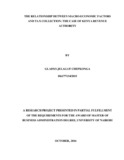| dc.description.abstract | Kenya Revenue Authority (KRA) collects more than 95% of all government revenue.
Through taxation, government is able to raise revenue that is sufficient for public
spending without too much borrowing. Tax revenue may be affected by various
factors such as inflation, unemployment, tax rates, level of actual income and foreign
direct investment. A number of studies have been done in Kenya as far as tax
collection is concerned but still we are not effective thus the study was meant to
identify if macro-economic factors affect tax collection in KRA and if so what is its
relationship and level of significance. The study was based on descriptive case study
method. Quarterly data from 2005-2014 was collected using secondary method then
was coded and entered into Statistical Package for Social Sciences (SPSS, Version
22.0) for analysis. From the research findings, the amount of tax collected has been on
an upward trend since 2005-2014. The rate of Inflation has been fluctuating
longitudinally since 2005 with the highest inflation rate in the second quarter (April-
June) of 2008. FDI was significantly high in the year 2005 and 2014. The rate of
unemployment maintained a plataeu state till 2009 when the increase became
exponential. There was continuous increase in the level of disposable income since
2005-2014. From the study we can conclude that the rate of unemployment has high
level of significance as opposed to other variables. Rate of inflation comes second
whereas level of disposable income and FDI comes third and fourth respectively as
shown by the equation; Y= -6.847+ 1.470(ROI) + 0.0000(FDI) +0.168(LDI) +
15.012(ROU). The researcher recommends that the rate of unemployment be reduced.
Policy makers should come up with policies to control the inflation rate in Kenya
since it negatively affects tax collection. The limitations the study encountered was
that the ten year period data was not long enough to take into consideration the prereform
periods. Further research should be done on other macro-economic factors like
GDP and corruption since the ones mentioned in the study are not the only factors
affecting tax collection. The study focused on overall tax collection and not on
specific type of taxes. | en_US |



